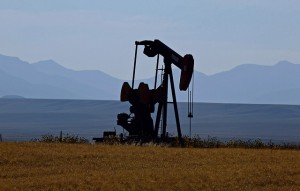 Oil prices have declined sharply over the last six months, with the U.S. benchmark closing below $50/barrel on Jan. 6th, for the first time since 2009. A number of factors have contributed to this fall in prices, including an increase in U.S. tight oil production and decreased global demand. Beyond the immediate financial benefits of lower fuel prices for U.S. consumers, the falling price of oil raises several policy questions. Impacts on financial markets and geopolitical tensions that could be exacerbated if the low price persists are only a few of the potential issues U.S. policymakers may find themselves dealing with.
Oil prices have declined sharply over the last six months, with the U.S. benchmark closing below $50/barrel on Jan. 6th, for the first time since 2009. A number of factors have contributed to this fall in prices, including an increase in U.S. tight oil production and decreased global demand. Beyond the immediate financial benefits of lower fuel prices for U.S. consumers, the falling price of oil raises several policy questions. Impacts on financial markets and geopolitical tensions that could be exacerbated if the low price persists are only a few of the potential issues U.S. policymakers may find themselves dealing with.
There is also great deal of speculation about how falling prices will impact U.S. oil producers. The Organization of Petroleum Exporting Countries (OPEC), led by Saudi Arabia, has chosen to utilize their influence to maneuver for market share rather than support higher prices. Made possible by very low production costs ($10-$25/barrel), this move is widely viewed as attempt to undercut existing and future investment in U.S. production. As a result, some have suggested that U.S. benchmark prices could dip to $20/barrel.
It’s important to note that eight U.S. states are heavily dependent on energy production for revenue and could face serious challenges if low prices persist. Further, the debate over crude oil exports has taken an abrupt turn, signaling how falling prices have changed the policy landscape.
How low will oil prices go and for how long? What are the most important policy implications of falling oil prices? Are low oil prices good for the U.S.?
Oil prices have fluctuated dramatically with supply, demand, logistical, and other economic drivers since Colonel Drake drilled his well. The key factor has been the oil in proven inventory, producible… Read more »
John’s comment above is one of the most accurate pictures of the current and future state of the global oil market I have seen on OEP. The collapse of oil… Read more »
Saudi Arabia’s gamble is not paying off. The U.S. response to falling oil prices since the OPEC decision has been to increase production of domestic oil and biofuels and reduce… Read more »
It is a little astonishing that the oil price slump is getting such mixed reviews. Yes, eight American states depend heavily on energy prices — which means 42 states are… Read more »
This can go two ways. A low price on oil can lead to another decade of increase global carbon emissions, or we can take advantage of the low price of… Read more »
The Saudis are getting ready to go carbon free while Congress argues about whether to export high cost US oil and how to force the President into facilitating transportation to… Read more »
When I spoke above about ideologues unrestrained by scientific fact or empirical evidence, I spoke about people who can make and believe statements such as “the Saudis are getting ready… Read more »
Name one politician or one DC think tank who predicted falling oil prices? So we should put beltway politicians in charge of national energy policy? The lesson to be learned… Read more »
The implication of falling oil prices for policy makers is that oil market volatility is here to stay. Recent events show that oil markets are balanced on a knife’s edge:… Read more »
Not mentioned here is that low prices have prompted numerous calls to increase fuel taxes, including a new one today in Newsweek: http://j.mp/1II2WoC. But I’m not sure this is going… Read more »
Low oil prices don’t appear to be a problem, but as time goes on, I expect that the big drop in oil prices will be increasingly viewed as a huge… Read more »
Gail: Scientists tell us we can’t burn more than 20~30% of the known fossil fuel reserves if we want to have a chance of staying below +2ºC warming. So if… Read more »
Gail, Peak oil theory has been predicated on the concept that current production is constrained by scarcity, not price. All the Hubbert curves showed production decreasing even as price rose.… Read more »
According to Duke Energy CEO Lynn Good recently …“Improvements in energy efficiency for buildings and appliances appear to have broken the traditional connection between electricity demand and economic growth.” Getting… Read more »
It is engrained in the public consciousness that the price of oil represents the price of energy in general. This correlation is a perceptual challenge with widespread financial and political… Read more »
What the crude oil price collapse near the end of 2014 is telling the world about the energy problem? One answer is energy problem can be solved with using more… Read more »
Rear Admiral Hyman G. Rickover, USN was right when he said “In the face of the basic fact that fossil fuel reserves are finite, the exact length of time these… Read more »
How about we stick to employment numbers from unbiased sources like the federal government instead of industry and trade associations. AWEA has put out fantasy numbers for years and we… Read more »
Ike: Solar City alone has 6,312 employees. SunPower has about the same. The numbers you quote don’t cover the vast number of solar employees because they, for the most part,… Read more »